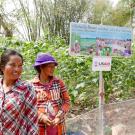"Improving smallholder vegetable farms are critical for improving food security and livelihoods of people in low‐income countries. Vegetable production is labor intensive and prone to pests and diseases. Conservation agriculture (CA) and integrated pest management (IPM) practices provide options to increase yields and minimize the use of chemical pesticides. We compared integration of CA and IPM practices (improved alternative system) with farmers’ traditional practice (conventional system) under replicated on‐farm tests in four different locations (Lalitpur, Banke, Surkhet, and Dadeldhura) in Nepal."
"Overall, the improved alternative system for vegetable crops contributed not only to the improved income and livelihoods of people, but also can improve environment and human health due to the reduced use of pesticides. Further research on scaling these improved alternative practices through appropriate farmer organizations, and government and non‐government actors can enhance the adoption of CA and IPM practices by smallholder vegetable producers."
Paudel, Sulav & Sah, Lalit & Devkota, Mukti & Poudyal, Vijaya & Prasad, P. V. Vara & Reyes, Manuel. (2020). Conservation Agriculture and Integrated Pest Management Practices Improve Yield and Income while Reducing Labor, Pests, Diseases and Chemical Pesticide Use in Smallholder Vegetable Farms in Nepal. Sustainability. 12. 6418. 10.3390/su12166418.

